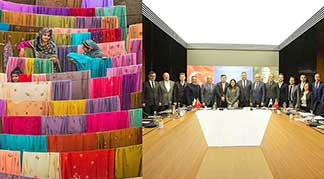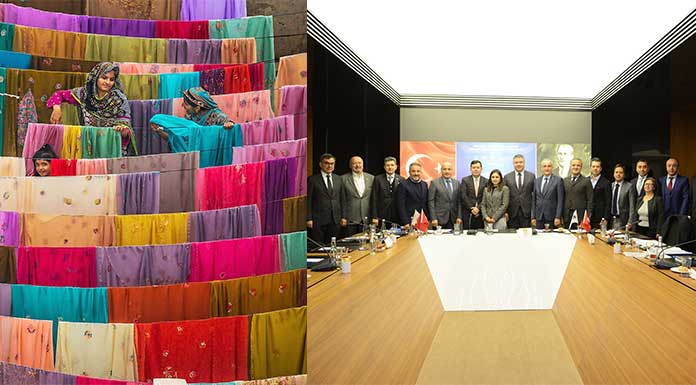
It is stated that textile and ready-to-wear industries may be adversely affected by a possible free trade agreement with Pakistan. Chinese and Bangladeshi products entering Turkey through Pakistan could create unfair competition according to sector professionals.
What would be the effects on textile and ready-to-wear sector of a possible free trade agreement between Pakistan and Turkey which are still developing in the textile industry? Important names of the industry came together in order to find the answer to this question.
Hosted by Istanbul Textile and Apparel Exporters’ Associations (İTKİB) on March 4, 2019, İstanbul Textile and Raw Materials Exporters Association (İTHİB) Chairman Ahmet Öksüz, İstanbul Apparel Exporters’ Association (İHKİB) Chairman Mustafa Gültepe, Istanbul Chamber of Industry Vice President Irfan Özhamaratlı, TOBB Ready-Made Clothing and Garment Industry Council Honorary Chairman Şeref Fayat and İTHİB and İHKİB’s Board Members attended the meeting in addition to the officials of the Ministry of Commerce.
The main topic of the meeting was; how a contract that is likely to be signed, will affect the most powerful items of our exports: textile and raw materials and ready-to-wear and apparel sectors. Turkey-Pakistan Free Trade Agreement (FTA) was signed in Islamabad in March 2016. The effects of a free trade agreement on the textile and ready-to-wear industries were evaluated following the framework agreement with Pakistan. It is emphasized that, textile and ready-to-wear products, entering in an uncontrolled manner through Pakistan, which has a free trade agreement with countries such as China and Bangladesh, could create unfair competition.
What Would a Free Trade Agreement with Pakistan Bring? The trade volume of the two countries is 600 million dollars
Turkey’s annual trade volume with Pakistan decrease to 600 million dollars from 1 billion dollars. The officials of both countries are negotiating to increase this trade volume to more than 1 billion dollars again. At a meeting in late 2018; Pakistani President Arif Alvi said Turkish investors were willing to invest in various industries in Pakistan. Pointing out that 4 Turkish companies are ready to invest 1.5 billion dollars in Pakistan; Alvi noted that there were certain issues to be addressed first. President Alvi announced that Turkey and Pakistan will recently sign a free trade agreement.
According to Ministry of Economy of Turkey data of 2016; while the foreign trade volume of the two countries was 610 million dollars; exports to Pakistan from Turkey was 347 million dollars. Pakistan’s exports to Turkey totalled 263 million dollars. In Turkey’s exports to Pakistan, items such as; helicopters, aircraft, space vehicles, telephone equipment, milk, woven carpet and cotton yarn stood out; while cotton fabric, cotton yarn, polyacetals, pencils and textile products are the most important items of Pakistan’s exports to Turkey.
Pakistan, the 23rd largest economy in the world, has a population of 207 million people; and a national income of 1.641 dollars per capita. Textile is one of the most important business lines in the national economy, which grew by 5.2% in 2018. Textile is an important branch of business; with a share of 40% in employment and a share of 60% in total exports.


